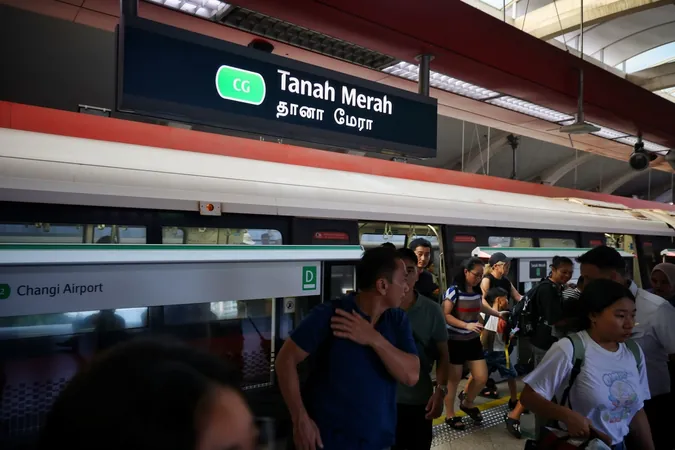
Unlocking the Mind: How Negative Thinking Fuels Cognitive Decline in Seniors
2025-09-15
Author: John Tan
The Silent Threat of Negative Thoughts
A groundbreaking study reveals that repetitive negative thinking (RNT)—the cycle of dwelling on past troubles and worrying about the future—could be a significant factor in cognitive decline among older adults. The research from Wuhan highlights a detrimental link particularly among those aged 60-79 with higher education levels.
Why Positive Thinking Matters Now More Than Ever
We've long been advised to "think positive, live positive." But this research suggests that this age-old wisdom holds critical importance for older individuals. Persistent negative thoughts may not just cloud perceptions but could actually erode memory, attention, and reasoning capabilities as we age.
Key Findings From the Wuhan Study
Involving 424 participants aged 60 and above, the study deployed the Perseverative Thinking Questionnaire (PTQ) to assess levels of RNT and the Montreal Cognitive Assessment Scale (MoCA) for cognitive performance. Alarmingly, those in the higher RNT quartiles exhibited significantly poorer cognitive scores. Even when controlling for factors like age, education, and lifestyle, the trend persisted, particularly in younger elderly individuals.
Building on Existing Research
This isn’t the first time scientists have explored this connection. Previous studies, including one by University College London (UCL), indicated that high RNT correlated with accelerated cognitive decline over four years, particularly affecting memory and attention. Some studies even show that individuals become aware of cognitive changes long before tests indicate problems.
What Triggers Cognitive Decline in Seniors?
Researchers propose that RNT contributes to cognitive decline through several mechanisms: - **Stress Responses:** Ongoing negative thoughts can trigger stress, leading to elevated cortisol levels and inflammation that might harm neuronal health. - **Cognitive Debt:** This concept suggests that negative thinking consumes mental resources, leaving less for essential cognitive functions. - **Biomarker Changes:** RNT has been linked to greater amyloid and tau deposits—signs of Alzheimer’s—even in cognitively healthy individuals.
Take Action: Implications for Seniors and Caregivers
Understanding the significance of RNT opens doors for early intervention. Mental health professionals should integrate questions about rumination and worry into standard cognitive screenings. Interventions such as cognitive behavioral therapy (CBT), mindfulness, and lifestyle changes can potentially curb negative thinking patterns.
Tailoring Interventions for Greater Impact
As the findings reveal stronger connections between education and age, tailored strategies for different groups will be essential. For instance, older adults with higher education might engage better with cognitive strategies, while those with less education may need simpler, supportive approaches.
Limitations and Future Directions
While the study sheds light on crucial connections, it has its limitations. The snapshot method of data collection doesn’t confirm whether RNT causes cognitive decline or vice versa. Additionally, being a localized study in Wuhan raises questions about diversity in broader populations. Long-term research is essential to determine causative relationships and the effectiveness of intervention strategies.
Final Thoughts: Mind Over Matter
The emerging evidence underscores a crucial message: how we think may be as pivotal as what we do to safeguard against cognitive decline. By promoting awareness of negative thought patterns and fostering a supportive environment, there's a promising pathway toward healthier aging. For older adults, families, and caregivers, the key takeaway is clear: nurturing positive mental habits could profoundly influence cognitive health.


 Brasil (PT)
Brasil (PT)
 Canada (EN)
Canada (EN)
 Chile (ES)
Chile (ES)
 Česko (CS)
Česko (CS)
 대한민국 (KO)
대한민국 (KO)
 España (ES)
España (ES)
 France (FR)
France (FR)
 Hong Kong (EN)
Hong Kong (EN)
 Italia (IT)
Italia (IT)
 日本 (JA)
日本 (JA)
 Magyarország (HU)
Magyarország (HU)
 Norge (NO)
Norge (NO)
 Polska (PL)
Polska (PL)
 Schweiz (DE)
Schweiz (DE)
 Singapore (EN)
Singapore (EN)
 Sverige (SV)
Sverige (SV)
 Suomi (FI)
Suomi (FI)
 Türkiye (TR)
Türkiye (TR)
 الإمارات العربية المتحدة (AR)
الإمارات العربية المتحدة (AR)